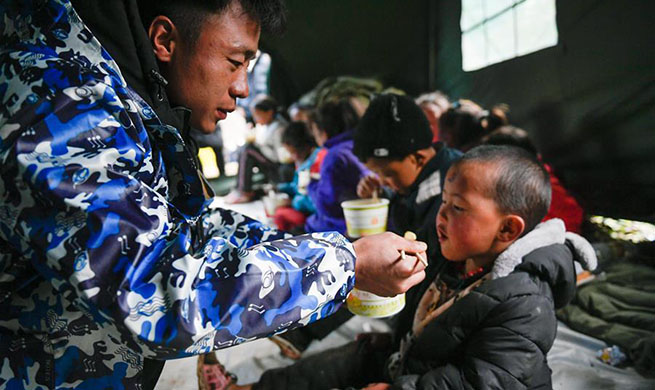BEIJING, Oct. 16 (Xinhua) -- Correspondents at Xinhua News Agency have recently interviewed Shohrat Zakir, chairman of the Government of Xinjiang Uygur Autonomous Region, on counterterrorism and the vocational education and training program in the region. The following is the full transcript of the interview:
Question: Would you please brief us on the current situation in Xinjiang, given that under the influence of international terrorism and religious extremism, the number of violent terrorist attacks had been on the rise in parts of the region over a period of time?
Answer: Since the 1990s, the "three evil forces" (terrorism, extremism and separatism) in China and abroad have plotted, organized and conducted thousands of violent terrorist attacks including bombings, assassinations, poisoning, arson, assaults, unrest and riots, causing the deaths of a large number of innocent people and hundreds of police officers, as well as immeasurable property damage. The horrific crimes of terrorists not only severely undermined the stable and peaceful order and the atmosphere of solidarity and progress of Xinjiang, but also trampled upon the essential human rights of people of all ethnic groups in the region, such as their rights to life, health, property and development. People of all ethnic groups in Xinjiang were enraged and shared hatred toward the terrorist crimes. A child of a Uygur police officer who died in the line of duty wrote me a letter. In emotional words, the letter reads: "My father sacrificed his life on the counterterrorism frontline. His upright personality will always inspire me. I hope that the Party and government can unwaveringly root out terrorism so that no children grow up without their fathers."
Facing complex and grave circumstances as well as the pressing anti-terrorism desire of the people, the Chinese government has resolutely taken measures in preventing and combating violent terrorist crimes in accordance with the law. In the past few years, under the firm leadership of the Communist Party of China (CPC) Central Committee with Comrade Xi Jinping at the core, Xinjiang has thoroughly carried out the policies of the CPC Central Committee on governing Xinjiang, unswervingly worked for the general goal of ensuring social stability and long-term security and made major achievements in fighting against terrorism and safeguarding stability. Now Xinjiang is generally stable, with the situation under control and improving. In the past 21 months, no violent terrorist attacks have occurred and the number of criminal cases, including those endangering public security, has dropped significantly. Public security has notably improved with religious extremism effectively contained, while people are now feeling more secure. We have laid a good foundation for completely solving the deeply-rooted problems that affect the region's long-term stability.
Xinjiang has started to enjoy the dividend of effective counterterrorism efforts with its economy steadily growing, people's livelihood improving, and overall progress being made in all respects. In 2017, the region had a 7.6 percent growth in GDP while the per capita disposable income of urban and rural residents increased by 8.1 percent and 8.5 percent, respectively. Tourism boomed in 2017 when the region registered more than 100 million trips by domestic and international tourists, a year-on-year growth of 32.4 percent. In the first nine months of this year, Xinjiang has already recorded 132 million trips by tourists from home and abroad, a 40 percent year-on-year increase. Many people who have visited Xinjiang used social media to extol the region's progress: Today's Xinjiang is not only beautiful but also safe and stable. No matter where they are or at what time of the day, people are no longer afraid of going out, shopping, dining and traveling.
Question: It has been reported that Xinjiang has launched a vocational education and training program in a bid to facilitate its efforts to counter terrorism and extremism. What's the thinking behind this move?
Answer: Terrorism and extremism go against human civilization and are the common enemy of the international community. Countering terrorism and eradicating extremism is a global issue as well as a global headache. Over the years, many countries have pursued approaches to countering terrorism and extremism according to their own conditions and have made headway in this regard. The international community has also realized that terrorism and extremism are very hard to root out and can easily resurge. Drawing on the anti-terrorism experience of the international community, China has actively responded to the UN General Assembly's resolution on Global Counter-Terrorism Strategy, and has been committed to addressing conditions conducive to the spread of terrorism, while preventing and combating terrorism. Based on its realities, China has combined fighting and preventing terrorism with an emphasis on prevention. China has been actively exploring and applying preventive measures in countering terrorism and extremism.
Based on its own realities, Xinjiang has given equal importance to fighting and preventing terrorism, and sought to combine the fight against violent terrorist crimes with the protection of human rights. On one hand, Xinjiang has put emphasis on strictly countering a small number of violent terrorist crimes according to law, and spared no efforts in protecting the basic human rights of the citizens from the harm of terrorism and extremism. On the other hand, Xinjiang has also stressed addressing the root cause of terrorism, and moved to bring around, educate and save the majority of those who committed petty crimes, through assistance and education, to prevent them from becoming victims of terrorism and extremism.
Today, despite the significant progress Xinjiang has made, countering terrorism and extremism is still a long-standing, complicated and serious issue and calls for high alert. In particular, the four prefectures in southern Xinjiang were threatened by terrorism and seriously influenced by the spread of religious extremism in the past. Some residents there have a limited command of the country's common language and a limited sense and knowledge of the law. They often have difficulties in finding employment due to limited vocational skills. This has led to a low material-basis for residents to live and work there, making them vulnerable to the instigation and coercion of terrorism and extremism. There is still a long way to go for southern Xinjiang to eradicate the environment and soil of terrorism and religious extremism.
Based on the above-mentioned situation, Xinjiang has launched a vocational education and training program according to the law. Its purpose is to get rid of the environment and soil that breeds terrorism and religious extremism and stop violent terrorist activities from happening. (more)

















